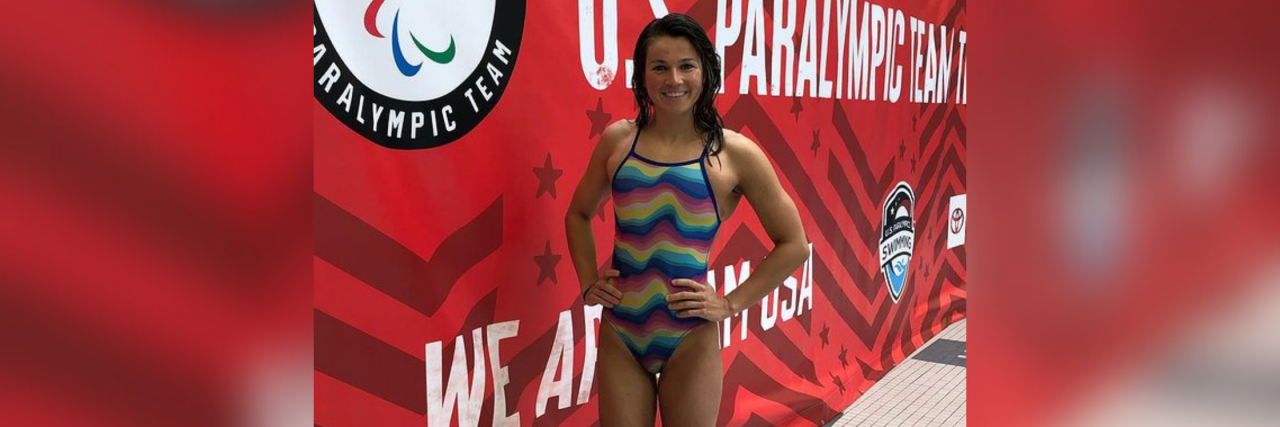Two-time Paralympic swimmer Becca Meyers, 26, was all set for Tokyo — she’d qualified for the 2021 Paralympics and was seemingly ready to dominate the competition. Until, that is, the U.S. Olympic and Paralympic Committee denied her the accommodations she’d need to safely navigate the Paralympics.
Meyers, one of the only deaf-blind swimmers on the Paralympic swimming team, was born with Usher syndrome, a rare genetic condition that left her deaf since birth and has also caused progressive vision loss. In her day-to-day life, she requires a personal care assistant (PCA) to help her with everyday tasks, like navigating public transportation and making her way to her events. The six-time medalist navigated the 2016 Rio Paralympics without a PCA — a mistake she quickly learned she’d never make again.
But this year, the USOPC claims that because of COVID-19 restrictions, Meyers isn’t allowed to bring her own PCA to Tokyo for the Paralympics.
Meyers’s mom has also acted as her PCA since just after the 2016 Rio Olympics, but Meyers has been told that the Japanese government and the Tokyo 2020 organizing committee is denying foreign visitors in order to reduce the spread of COVID-19. This presents tremendous problems for Meyers and her fellow Paralympic athletes, many of whom need support from assistants they trust.
Although the U.S. Paralympic swim team will have one PCA on hand for its 34 athletes to share, it may not be easy for Paralympic athletes with a wide range of support needs to get the assistance they need without multiple PCAs allowed to travel. Athletes like Meyers, whom the USOPC deems “high-functioning” enough not to receive additional accommodations, may have difficulty navigating their new environment and could feel uncomfortable without their regular PCAs to help them in their day-to-day lives.
Meyers has chosen to withdraw from the Paralympics because she doesn’t feel safe attending the competition without her mother — and her mother’s knowledge of her needs.
Becca Meyers maintains that though Japan has legally barred nonessential workers from crossing their borders, her own PCA is “essential.” She’s “disgusted” by the USOPC’s handling of her need for accommodations and states, “This culture [of revoking necessary accommodations] needs to change. I need to stand up for… athletes like me… As a disabled person, why am I still fighting for my rights in 2021?”
Meyers raises a valid question, especially considering how much unexpected, unwarranted ableism many people with disabilities still face. Living with a disability today unfortunately doesn’t mean that you’ll receive the accommodations you‘re legally permitted, but it does mean that you may spend an inordinate amount of time fighting to access the same world that many able-bodied people take for granted.
Becca Meyers’ decision to withdraw from the Paralympics after being denied a trusted PCA isn’t an isolated incident — and it’s indicative of a far wider-reaching accessibility problem. Many people assume those with less visible disabilities are too “able-bodied” to need certain accommodations but don’t understand that disability is diverse and variable. The Paralympics boasts some of the most talented athletes with disabilities, and it’s easy for the USOPC to see their athletic prowess and forget about the accommodations they need to perform their best. Much of the world is still inaccessible to people with disabilities, but the Paralympic governing bodies should lead the way by accommodating their athletes’ access needs. Otherwise, they’ll continue to alienate talented athletes and prevent Paralympic hopefuls from competing at a global level.
Deaf-blind Paralympic champion Becca Meyers never should have needed to withdraw from this year’s Games — the USOPC should have accommodated her no matter how they believe her disability presents. The U.S. Olympic and Paralympic committee needs to expand their knowledge of how disability presents and understand that accommodations are always essential to full inclusion — even during a pandemic. The Paralympics are just a microcosm of an inaccessible world, but once they change their policies towards accommodations and truly listen to their athletes, the rest of the world might learn how important accessibility is too.
Image via Instagram.

